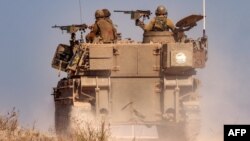While Israeli ground troops surrounded Gaza, the Middle Eastern nation began expelling thousands of Palestinian workers back to the besieged territory, despite the ongoing fighting and air strikes that have killed thousands of civilians.
In Geneva, the United Nations launched an emergency aid appeal seeking $1.2 billion to help some 2.7 million people facing a humanitarian crisis in Gaza and the West Bank.
The leader of Lebanon's Iranian-backed Hezbollah, Hassan Nasrallah, was to make a speech later in the day, breaking weeks of silence, amid concerns of a broader regional conflagration.
Ahead of Blinken's arrival, Israel's military said it had "completed the encirclement" of Gaza's largest city — signaling a new phase in the nearly month-long conflict.
Fighting was triggered by Hamas' bloody raids on October 7, which Israeli officials say killed more than 1,400 people.
The health ministry in Hamas-run Gaza says more than 9,000 people have died in Israeli bombardments, mostly women and children.
After the Hamas assault, Israeli forces moved to re-establish security on the border, trapping thousands of Palestinian workers inside Israel.
On Friday, officials began to force the workers back into Gaza, AFP journalists that were at the Karem Abu Salem crossing.
Hisham Adwan, head of Gaza's crossings authority, told AFP "thousands of workers who were blocked in Israel since October 7 have been brought back."
Workers Expelled
Israel said late on Thursday it would start sending the workers back to Gaza.
"Israel is severing all contact with Gaza. There will be no more Palestinian workers from Gaza," the Israeli security cabinet said in a statement.
The United Nations Human Rights Office said it was "deeply concerned" about the expulsions.
Speaking during a news conference in Geneva, Elizabeth Throssell, the spokesperson for the U.N.'s Human Rights Office said, "they are being sent back, we don't know exactly to where."
Throssell said the U.N. does not know whether the workers "even have a home to go to."
Before the war started, some 18,500 Gazans were holding Israeli work permits, according to figures provided by COGAT, the Israeli defense body responsible for Palestinian civilian affairs.
COGAT would not immediately say how many of those Gazans were working inside Israel on October 7.
New Israeli strikes rocked the Gaza Strip on Friday morning, an AFP correspondent said, and the Gaza health ministry reported at least 15 deaths in Gaza City's Zeitun neighborhood and seven in Jabalia refugee camp.
The Hamas government has said 195 people were killed in Israeli bombardments on Jabalia earlier this week, with hundreds more missing and wounded, figures AFP could not independently verify.
Before his departure, Blinken said he would seek to ensure that harm to Palestinian civilians is reduced, in a visible shift of tone for the United States which has promised full support and ramped-up military aid to Israel.
"We will be talking about concrete steps that can and should be taken to minimize harm to men, women and children in Gaza," Blinken said.
"This is something that the United States is committed to," he added.
Prime Minister Benjamin Netanyahu said Israel had already had some "very impressive successes" with troops "more than on the outskirts of Gaza City.
Speaking at a base near Tel Aviv late Thursday, Netanyahu said “We are advancing."
Israel's military describes Gaza City as "the center of the Hamas terror organization."
Although many of the city's half-a-million residents fled south following Israel's warning to leave ahead of a ground operation, those who stayed behind have endured weeks of aerial bombardment, dwindling supplies and daily carnage.
On Friday, the U.N. Office for the Coordination of Humanitarian Affairs, OCHA, said the cost of meeting the needs of the 2,7 million people living in Gaza and the Israeli-occupied West Bank had risen to $1.2 billion, and launched an appeal for donors.
Both Israel and the United States have ruled out a blanket cease-fire, which they say would allow Hamas to regroup and resupply.
U.S. President Joe Biden has backed "temporary, localized" pauses in fighting to allow humanitarian work to be done.








Forum